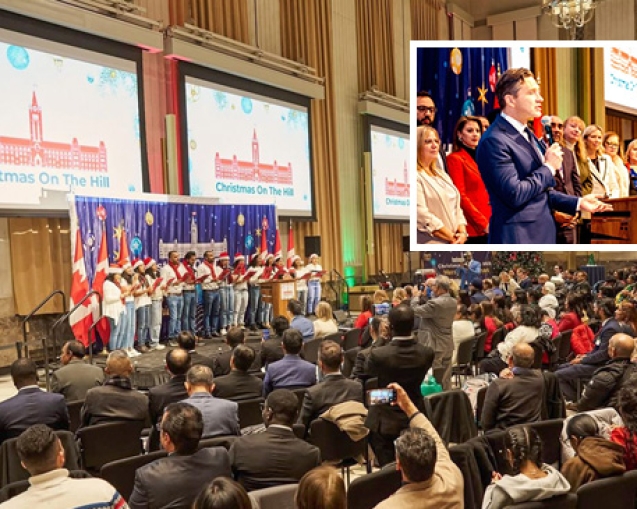INTRODUCTION
In the recent wave of Guinness World Record pursuits in Ghana, notable individuals such as Afua Asantewaa Aduonum and Chef Faila have garnered widespread attention. Their remarkable feats include Afua’s awe-inspiring six-day Singathon, which spanned an impressive 127 hours, and Chef Faila’s ongoing seven-day Cookathon, aiming to set a record by reaching 240 hours. These extraordinary endeavours have captured the public eye, showcasing not only the determination of the individuals involved but also contributing to the cultural and creative landscape of Ghana. These endeavours not only showcase human achievements but also foster innovation, inspiration, and national pride. However, amidst the pursuit of temporal recognition, a critical reflection emerges on whether these endeavours yield eternal rewards. This reflection prompts believers to collectively assess their endeavours in establishing godly records, finding inspiration from revered spiritual figures such as Jesus Christ, Peter, Paul, Martin Luther, Saint Jerome, William Tyndale, and William Seymour, as well as contemporary influences like James McKeown and Michael Kwabena Ntumy.
The pivotal question arises: What proactive steps are today’s believers taking to cultivate a legacy akin to their esteemed forebears? The aspiration is to craft a narrative that inspires the present and serves as a catalyst for the next generation to surpass current achievements. Aligning with Jesus’ profound words in John 14:12, believers commit to surpassing past remarkable works, driven by faith, to extraordinary heights.
This piece serves as a call to action, urging individuals of faith to transcend temporal achievements and focus on setting godly records for eternal rewards. Within The Church of Pentecost, there’s a specific emphasis on surpassing predecessors and ushering in a new era of godly achievements. The present moment offers a unique opportunity for believers to contribute to the spiritual landscape, leaving an enduring legacy for future generations. They must be guided by the divine challenge in John 14:12, propelling them towards a future where faith shapes history and leaves an indelible mark on God’s eternal plan.
TEMPORAL RECOGNITION VERSUS ETERNAL REWARDS
In the pursuit of temporal recognition, a crucial dichotomy unfolds against the backdrop of enduring significance: temporal recognition vs. eternal rewards. While accolades and worldly acknowledgment may provide fleeting satisfaction, the discerning mind contemplates whether such pursuits yield lasting, eternal dividends. This dichotomy calls for introspection, challenging individuals to weigh the immediate allure of worldly acclaim against the enduring value of actions rooted in eternal principles. It beckons a shift in focus from the transient applause of the present to the timeless rewards promised in a spiritual context. In this introspective journey, the quest for eternal rewards takes precedence, reminding us to prioritise actions that contribute to a legacy resonating beyond the temporal boundaries of recognition, aiming for enduring significance and eternal impact.
Biblical figures such as Jesus Christ, Peter, and Paul, alongside revered figures in church history like Martin Luther, Saint Jerome, William Seymour, and William Tyndale, have profoundly shaped the course of Christianity by fighting for eternal rewards ahead of temporal recognition in their generations. These iconic individuals laid enduring foundations for the faith, contributing to its theological richness and global spread. In the contemporary landscape, noteworthy figures like James McKeown, Michael Kwabena Ntumy, and others have emerged as influential voices in today’s Christianity. Their contributions echo the ongoing narrative of faith, bridging the historical legacy of biblical characters and early church leaders with the dynamic expressions of contemporary Christian thought and practice. Together, these figures form a continuum, each contributing distinctively to the vibrant tapestry of Christian history and its evolution over time.
REFLECTING ON SPIRITUAL STALWARTS: FROM FOUNDATIONAL FIGURES TO CONTEMPORARY VOICES
At the heart of Christianity stands Jesus Christ, the seminal figure whose teachings, crucifixion, and resurrection laid the cornerstone of the faith, offering redemption to humanity. Alongside him, Peter, a pivotal member of the Twelve Apostles, emerged as a primary spokesperson and leader in the early Christian community. Paul, initially a persecutor of Christians, underwent a transformative conversion, becoming a prolific missionary and contributing significantly to the theological understanding of salvation through grace. Together, these foundational figures established the bedrock of Christian doctrine and practice through their teachings and sacrificial commitments.
Moving into the era of reform, Martin Luther challenged the established doctrines of the Catholic Church with his emphasis on justification by faith. His “95 Theses” ignited the Protestant Reformation, reshaping the Christian landscape. Saint Jerome’s translation of the Bible into Latin (Vulgate) during the 4th century left an enduring impact on Christian theology and scripture. In the early 20th century, William Seymour played a crucial role in the Azusa Street Revival, emphasising the significance of the Holy Spirit in the Pentecostal movement. William Tyndale’s English translations of the Bible made scripture accessible to a wider audience, significantly contributing to the development of the English Bible.
In the contemporary Christian tapestry, notable figures like Reverend James McKeown, the founder of The Church of Pentecost, which is renowned for pastoral leadership and evangelism in Ghana and beyond, contribute to the ongoing legacy. Apostle Michael Kwabena Ntumy, as a former chairman of The Church of Pentecost, has played a vital role in shaping Pentecostal Christianity in Ghana and beyond. These contemporary voices seamlessly continue the rich legacy of their predecessors, offering spiritual guidance, theological insights, and leadership to ensure the ever-evolving Christian community remains relevant and impactful in the present age.
GUIDING PRINCIPLE: JOHN 14:12
What inspired these revered figures to surpass legacies and tread extraordinary paths? The driving force behind their exceptional commitment can be traced to Jesus’ pivotal statement to his disciples in John 14:12, a foundational principle shaping their transformative journeys. Jesus’ resonant words carry immense transformative power: “Very truly, I tell you, whoever believes in me will do the works I have been doing, and they will do even greater things than these, because I am going to the Father.” This declaration serves as an illuminating beacon, guiding believers to emulate Christ’s footsteps while simultaneously aspiring to new heights of spiritual impact.
Derived from this scripture, a divine challenge takes root—an invitation to surpass the remarkable works of the past. Jesus, embodying the pinnacle of faith and divine action, transcends mere modelhood, becoming an aspirational benchmark, for “Christ’s power is not only shown within his own person, but it is spread through the body of his entire church.” The call to believe in and replicate His works acts as a powerful catalyst, propelling believers beyond the confines of historical achievements. It beckons them to transcend familiar boundaries and enter a realm where faith becomes the propulsive force, lifting them to extraordinary heights of spiritual influence and service.
This commitment is not a mere call to replicate history but to surpass it, urging believers into uncharted territories where faith stretches its bounds and its impact is magnified. It encourages a paradigm shift, where the unfolding narrative of faith transforms into a dynamic, ever-expanding journey into the miraculous. Aligning with Jesus’ words in John 14:12 signifies more than a connection to Christianity’s historical roots; it symbolises an active participation in an ongoing, transcendent narrative of faith promising even greater manifestations of divine grace and power.
CALL TO ACTION FOR BELIEVERS: SURPASSING GUINNESS WORLD RECORD FOR SPIRITUAL LEGACY
In the current Ghanaian landscape, the fervour for breaking Guinness World Records has become a prevailing trend, with individuals seeking temporal recognition for various feats. However, contemporary believers should embrace a more profound call to action: setting spiritual legacies that transcend mere temporal achievements. This call becomes even more critical amid the prevailing culture where breaking world records is a dominant pursuit. Unlike the transient accolades associated with Guinness World Records, the emphasis here is on establishing godly records that yield eternal rewards in heaven.
This imperative resonates strongly within The Church of Pentecost, where a transformative agenda is underway, propelling believers to surpass the achievements of their predecessors. The call to action is embedded in the unleashing agenda, a paradigm shift where members are not merely breaking records for the world’s applause but are being unleashed to transform their world. The agenda focuses on spiritual impact, aligning with the divine challenge articulated in John 14:12.
Contemporary believers, particularly within The Church of Pentecost, are encouraged to contribute to a lasting spiritual legacy that echoes through eternity, transcending the temporal pursuits of worldly acclaim and Guinness World Records. In this call to action, the faithful are empowered to forge a path towards spiritual significance that outshines the ephemeral allure of breaking records for records’ sake.
In this present moment, believers stand at a unique juncture to initiate an unparalleled era of godly records. Beyond merely shaping the spiritual landscape, it entails creating a legacy that will endure for generations. It is a call to transcend the transient and embark on a journey that not only contributes to the present spiritual narrative but also leaves an indelible mark, resonating through the annals of time for those who follow. The present opportunity beckons believers to be architects of a spiritual heritage that transcends the immediate, fostering a lasting impact on the future of faith.
CONCLUSION
In the pursuit of a spiritual legacy amidst Ghana’s penchant for Guinness World Records, this narrative emphasises the timeless importance of setting godly records that yield eternal rewards. Believers are called to surpass the remarkable works of the past, as articulated in the divine challenge of John 14:12. This piece serves as a resounding call to action for contemporary believers, urging them to transcend temporal achievements and focus on forging a lasting spiritual legacy. Within The Church of Pentecost, this call is heightened through the unleashing agenda, urging members to contribute to an enduring spiritual narrative that surpasses worldly pursuits.
The commitment to align with John 14:12 signifies not only a connection to historical roots but active participation in an ongoing, transcendent narrative of faith, promising even greater manifestations of divine grace and power. As believers stand at a unique juncture, the present moment beckons them to initiate an unparalleled era of godly records, contributing not only to the spiritual landscape but also leaving a legacy that resonates through eternity, shaping the future of faith for generations to come.
Written by Pastor Emmanuel Foster Asamoah (Abasraba District, Winneba)


















